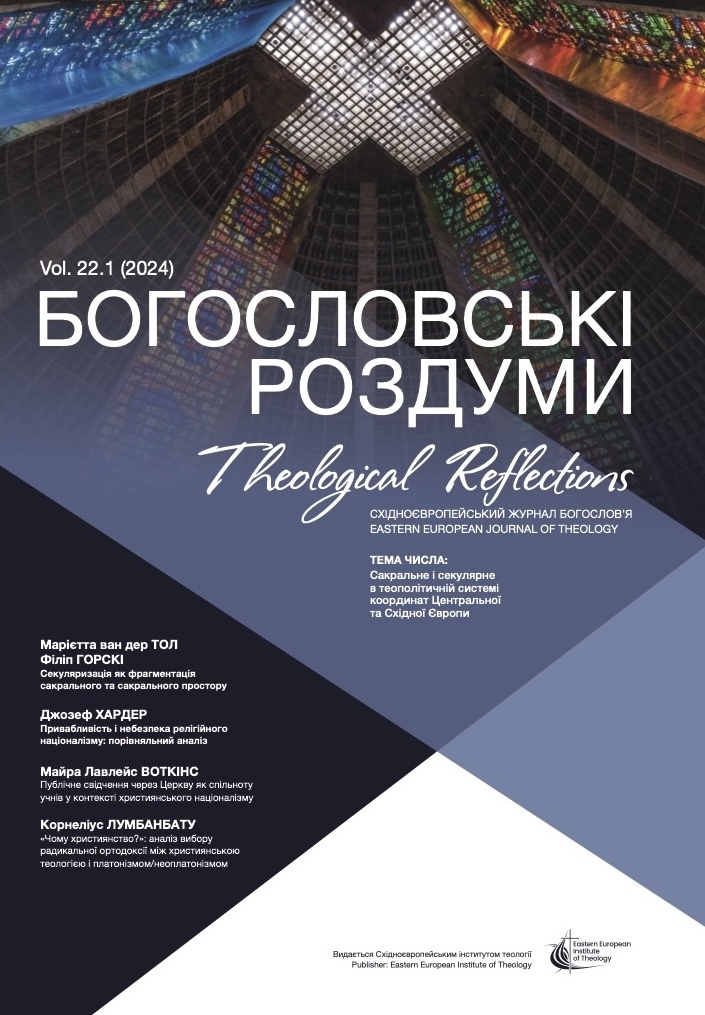“The Main Questions of Christian Ethics”: Following Dietrich Bonhoeffer’s Barcelona Lecture
DOI:
https://doi.org/10.29357/2789-1577.2024.22.1.5Keywords:
Bonhoeffer, responsible action, “last things”, “penultimate things”, God’s will, pacifism, war, ethics, Sermon on the Mount, moral commandments, Ordnungen, völkisch, lebensraumAbstract
The intellectual legacy of Dietrich Bonhoeffer (1906–1945), one of the most influential theologians of the 20th century, has been interpreted in various ways. His ideas were both mooched off of and developed. His judgments regarding certain elements of Christian ethics were no exception. In order to avoid falling into the trap of modern interpreters of Bonhoeffer, who often tailor the views of this theologian to fit their own paradigm, accepting some of his ideas and ignoring others, it is necessary to independently research the entirety of his works, which have survived and reached us thanks to his student and friend, Eberhart Bethge. Therefore, the purpose of this essay is to comprehensively examine those parts of Bonhoeffer’s work that receive the least attention in wider theological circles. In other words, we will see the statements of a different Bonhoeffer, not the one that is known to the general readership. Bonhoeffer’s dissertations, books, articles, sermons, lectures, correspondence, poetry, etc., totaled sixteen volumes. The Lutheran theologian developed his concept of ethics throughout his (unfortunately, very short) life, but this concept is known mostly for Bonhoeffer’s key work of the ‘40s, aptly titled – “Ethics.” Therefore, in order to understand where his original and sometimes radical ethical ideas originate, one should turn to the texts of Dietrich Bonhoeffer and his biography. The relevance of our material lies in the fact that the Ukrainian reader is largely unfamiliar with Bonhoeffer’s early works. Moreover, today’s Ukrainian reader only has a translation of his letters and notes from prison. To investigate the ethical teaching of this German theologian, researchers should start with his Barcelona lecture and move to his life’s work, that is, to the aforementioned “Ethics.” Bonhoeffer’s work is relevant more than ever in the current Ukrainian context, which is essentially a state of war with Russia’s invading horde and in which ordinary Christians (and not only they) face ethical challenges on a daily basis. And although Bonhoeffer’s texts are written, to a greater extent, from the position of a German (it is difficult to justify the wars that Germany waged in the 20th century), he was still right on certain issues that will be discussed in the essay.
References
- Bonheffer, Dytrykh. Sprotyv i pokora. Lysty i notatky z-za grat. K.: Dukh i Litera, 2018.
- Nit͡sshe, Fridrikh. Tak kazav Zaratustra: Knyz͡hka dli͡a vsikh i ni dli͡a koho. Z͡Hadanni͡a vlady. Pereklad z nimet͡s′koï Anatoliǐ Onyshko ta Petro Tarashchuk. Dnipro, Kyïv: Osnovy, 1993.
- Nit͡sshe, Fridrikh. Vesela nauka. Pereklad z nimet͡s′koï V. B. Chaǐkovs′koho. Kharkiv: Folio, 2020.
- Bethge, Eberhard. Dietrich Bonhoeffer. Eine Biographie. München: Christian Kaiser Verlag, 1967.
- Bonhoeffer, Dietrich. Herausgegeben von Eberhard Bethge. Dietrich Bonhoeffer Werke. Band 1. Sanctorum Communio: Eine dogmatische Untersuchung zur Soziologie der Kirche. München: Verlagsgruppe Random House, 1986.
- Bonhoeffer, Dietrich. Dietrich Bonhoeffer Werke. Band 2. Akt und Sein: Transzendentalphilosophie und Ontologie in der systematischen Theologie. München: Verlagsgruppe Random House, 1988.
- Bonhoeffer, Dietrich. Dietrich Bonhoeffer Werke: Band 3. Schöpfung und Fall. Transzendantalphilosophie und Ontologie in der systematischen Theologie. München: Verlagsgruppe Random House, 1988.
- Bonhoeffer, Dietrich. Dietrich Bonhoeffer Werke: Band 4. Nachfolge. München: Verlagsgruppe Random House, 1989.
- Bonhoeffer, Dietrich. Dietrich Bonhoeffer Werke, Band 6. Ethik. München: Verlagsgruppe Random House, 1992.
- Bonhoeffer, Dietrich. Dietrich Bonhoeffer Werke, Band 10. Barcelona, Berlin, Amerika 1928–1931. München: Verlagsgruppe Random House, 1992.
- Bonhoeffer, Dietrich. Dietrich Bonhoeffer Werke: Band 11. Ökumene, Universität, Pfarramt 1931–1932. München: Verlagsgruppe Random House, 1994.
- Bonhoeffer, Dietrich. Dietrich Bonhoeffer Werke: Band 16. Konspiration und Haft 1940–1945. München: Verlagsgruppe Random House, 1996.
- Tillich, Paul. Die religiöse Lage der Gegenwart. Berlin: Ullstein, 1926.
- Schlingensiepen, Ferdinand. Dietrich Bonhoeffer. 1906–1945. Eine Biographie. München: Verlag C.H. Beck. 2006.
- Bonhoeffer, Dietrich. Dietrich Bonhoeffer Works, Volume 16. Conspiracy and Imprisonment. 1940–1945. Minneapolis, Fortress Press, 2006.
- De Gruchy, John W. “Biographies and Portraits”. In Michael Mawson, Philip G. Ziegler (eds.) The Oxford Handbook of Dietrich Bonhoeffer. Oxford: Oxford University Press, 2019: 462–471.
- Haynes, Stephen R. The Battle for Bonhoeffer. Grand Rapids, William B. Eerdmans Publishing Company, 2018.
- Marsh, Charles. Strange Glory: A Life of Dietrich Bonhoeffer. London: SPCK, 2014.
- Pugh, Jeffrey C. Religionless Christianity. Dietrich Bonhoeffer in Trouble Time. NY: T&T Clark, 2008.
Downloads
Published
How to Cite
Issue
Section
License
Copyright (c) 2024 Anatoliy Denysenko

This work is licensed under a Creative Commons Attribution-NonCommercial 4.0 International License.
All articles published in the Journal are distributed under a Creative Commons Attribution-NonCommercial 4.0 International License
By submitting an article for publication in Theological Reflections: Eastern European Journal of Theology the author grants the editors the right to publish the article and distribute it in electronic and print form.
The author reserves all copyrights and the right to use the materials of the article in whole or in part for educational purposes, to write his own dissertations, to prepare abstracts, conference reports, oral presentations, etc., as well as post electronic copies of articles (including the final electronic version downloaded from the journal’s official website) on non-commercial web-resources without the consent of the editorial board and founders.



